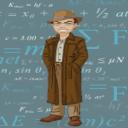Yahoo Answers is shutting down on May 4th, 2021 (Eastern Time) and beginning April 20th, 2021 (Eastern Time) the Yahoo Answers website will be in read-only mode. There will be no changes to other Yahoo properties or services, or your Yahoo account. You can find more information about the Yahoo Answers shutdown and how to download your data on this help page.
Trending News
Is mathematics true? If so, in what way? If not, why?
Time to step up and say what you believe. Is mathematics just a game we play we symbols, or does it describe something that actually exists, independent of what we humans choose to believe?
Elaborations of Platonists and fictionalists welcomed. Will give full marks for best answer.
of course i am aware of both(!) of gödel's incompleteness theorems. but that begs the question. i am fully ready to concede mathematics is both logical and (insofar as we know) potentially consistent (in light of quantum physics, i am fully prepared to relinquish completeness). but do the "laws of number" reflect a fact of the way the universe is constructed, or are they solely by-products of the cognitive function of our brains? do we "discover" math, or do we "invent" it?
the position that math is fiction is not so indefensible. newtonian mechanics were thought to be true for well over a century, but the fact that they did not accurately reflect reality did not stop newton's laws from being useful (for example, i believe NASA did not take relativistic effects into account when computing trajectories for the apollo moon missions).
and it is not a false dichotomy, nor (i believe) a question devoid of meaning. what is it we "know" when we know mathematics, a set of rules, or facts? th
of course i am aware of both(!) of gödel's incompleteness theorems. but that begs the question. i am fully ready to concede mathematics is both logical and (insofar as we know) potentially consistent (in light of quantum physics, i am fully prepared to relinquish completeness). but do the "laws of number" reflect a fact of the way the universe is constructed, or are they solely by-products of the cognitive function of our brains? do we "discover" math, or do we "invent" it?
the position that math is fiction is not so indefensible. newtonian mechanics were thought to be true for well over a century, but the fact that they did not accurately reflect reality did not stop newton's laws from being useful (for example, i believe NASA did not take relativistic effects into account when computing trajectories for the apollo moon missions).
and it is not a false dichotomy, nor (i believe) a question devoid of meaning. what is it we "know" when we know mathematics, a set of rules, or facts? th
7 Answers
- Anonymous1 decade agoFavorite Answer
This would seem to be a false dichotomy expressing two extreme positions.
Is mathematics useful. Palpably so.
Does it give consistent results when applied to the material world yes.
Is it consistent and complete. See Godel and Turing and Chaittin and others.
True means nothing in these contexts.
Edit
When you look at the universe your mind is creating a fiction anyway. We do not see the empty space that matter consists of. Reality/ truth has many levels .
Do you mean does mathematics come from a higher source and have a reality independent of our existence?
- Bob BLv 71 decade ago
Yes, mathematics has significant real-world implications. While it often looks like you're messing around with symbols, those symbols really do mean something. Let's look at some examples:
1- Suppose an object falls in a gravitational field. The mathematics of such a field is well known. Now calculus tells me that by integrating that formula a few times, I can get a formula that can give me the position of that object at a given time. Experimental evidence confirms that this formula is indeed accurate.
2- If you solve the Schrodinger equation in quantum mechanics, you can make predictions that are again confirmed by experimental evidence.
3- Equations in optics are able to predict interference patterns, again confirmed by experiment.
So yes, mathematics describes real things, and can be used to make accurate predictions about the real world.
- thom tLv 61 decade ago
Friday: I'll have to digest this when I have more time. For now:
Pi r not square; pi r round!
Saturday; I have more time.
What about:
1.Lies
2.Damn lies
3. Statistics
(statistics are/is maths, isn't/aren't it/they?)
And we all know that 90% of statistics are made up on the spot.
I'm avoiding your question. I can't speak as a mathematician, just as a human integer, but I think mathematics is/are true, and it reflects the truth of the physical universe.
Do I get the mathematical equivalent of 10^1 points?
Source(s): New mercy. - runningman022003Lv 71 decade ago
Keep in mind the the math we use to describe our world is just a model to represent the OUTCOME, not the reality. For example, although we may derive a complicated equation to describe the motion of a rocket, God/Mother Nature/Universe does not have to do any calculations...it just happens. So in this sense, the math is not "true".
- How do you think about the answers? You can sign in to vote the answer.
- 1 decade ago
You ask 'is it true?' in Aristotelian sense of arguing. Therefore yes it is true, because logic behind it speaks for itself.
But there are unavoidable inconsistencies in any formal system according to incompleteness theorem. In that sense, we have strong evidence to say that mathematics is totally a fabrication, not an absolute truth.
I personally, don't believe in mathematics as an absolute truth
- JamesLv 41 decade ago
True or false:
Suppose you have 1 apple in your right hand and 1 apple in your left hand this means that you have 2 apples.
True
1+1=2
Where do you get mathematics possibly being false? Incorrect answers are a possibility but math cannot be false.
- smatt454Lv 51 decade ago
Math describes everything. If you take at least one semester of physics, you'll see this.
Physics is basically all math. In experimentation, the equations we have theorized have explained everything to a degree of accuracy that is virtually perfect.
The only way math cannot be real, is if everything we perceive is not real. But if that's the case, I must be imagining everything, because if more than one person can perceive...it must be real. So if you can perceive this message, and you truly exists, then math truly exists.






